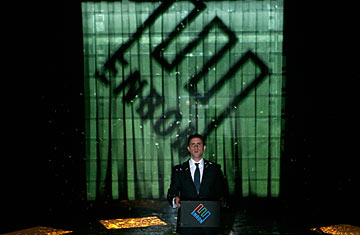
A scene from Enron at the Noel Coward Theatre in London on Jan. 25, 2010. Inspired by real-life events, using music, dance and video, the play explores one of the most infamous scandals in financial history
The biggest corporate fraud in history is turning into one of Broadway's most expensive plays. A team of theater producers is spending nearly $4 million to bring Enron to New York City from London. That's a fraction of what Hollywood routinely doles out, but on Broadway the multimillion-dollar budget of the play, which is set to open for previews on April 8, is drawing attention.
"They are spending a lot of money on a serious work and doing it during tough economic times, so it's a crapshoot," says Manny Azenberg, who produced Brighton Beach Memoirs for $500,000 in 1983.
The tough economic times, though, may be exactly what Enron has going for it. The play details the rise and fall of the notorious, eponymously named, Houston-based energy company, which collapsed amid fraud in 2002. The demise of Enron had little to do with mortgages, bank bailouts or any of the things that have been at the heart of the recent financial crisis. Nonetheless, the lead producer of Enron, Jeffrey Richards, says the play is sure to strike a contemporary chord with audiences.
Indeed, Richards and his partners got a bit of unexpected good news in mid-March. A newly released report uncovered accounting tricks at Lehman Brothers, causing many to compare the defunct investment bank, which failed in September 2008, to Enron. That put the energy company, at least briefly, in the headlines again. And Lehman Brothers is in the play as well, portrayed by two actors in an overcoat as a Siamese twin. "It's a play about our society and the way it attracts greed and corruption," says Richards. "Enron was the beginning."
What's more, producers say business plays can draw a bigger crowd than other productions. Susan Gallin, who produced in the mid-1980s the off-Broadway hit Other People's Money, about corporate raiders, says she remembers more men in the audience of that play than in others she has worked on. "There is an audience for business plays that just doesn't exist for other plays," says Gallin.
Just like the fraud, though, bringing Enron, which has been running in London for months, to Broadway is costing big bucks. In general, operating on Broadway has grown more expensive than it used to be. Producers say most plays cost between $2 million and $3 million to launch on New York's main stages these days. Musicals like Wicked can cost as much as $15 million, but they tend to draw bigger audiences than dramatic plays. The higher production costs are driving up ticket prices on Broadway and pushing out the time it takes productions to be profitable. Many plays can run for six months without turning a profit. Musicals take twice as long to get to the black.
Nonetheless, even by recent standards, Enron is a gamble. With 22 actors, it has a much larger cast than the typical play. It has numerous sets, a handful of musical numbers and three lurking, red-eyed velociraptors to represent Enron's hidden debt, among other props. The play has gotten rave reviews in London, and the director Rupert Goold, who is staying with the Broadway production, won London's Evening Standard award for best director. But the producers decided to replace the cast when they brought the play to New York. All that has driven up the budget for the play, which will probably cost about $300,000 a week to run, on top of the nearly $4 million the producers have already committed.
It is not clear how long the play would have to run in order to turn a profit. Enron is playing at Broadhurst Theaters, which has room for an audience of 1,186. Of those seats, 733 are on the theater's main floor. Tickets for most of those seats will cost $121.50, but the producers hope to sell a yet-to-be-determined number of so-called premium seats for as much as $251.50 on Friday and Saturday nights. In the theater's balcony, tickets will range from $121.50 for the best views to $66.50 for the back rows.
Based on those prices, a sold-out show would generate about $135,000 per performance. A sold-out week at full prices could generate as much as $1.1 million. At that rate, the show could be profitable in as little as two months, once you factor in the three weeks of previews, when ticket sales are likely to be light. Few plays, though, are able to generate that level of sales. The recent hit God of Carnage has had a handful of weeks when box-office sales topped $1 million. But that play, unlike Enron, had a number of big-name stars.
If, instead, Enron on an average night only fills about half the seats, it could take as long as five months before the play turns a profit. If only a quarter of the seats sell for full price, the play, much like the company it dramatizes, will end up being a financial bust.
Whatever happens, Richards says he and his fellow producers have no plans to use creative accounting to make their production profitable. "Like all plays, we have an accountant, and it is not Arthur Andersen," says Richards.
